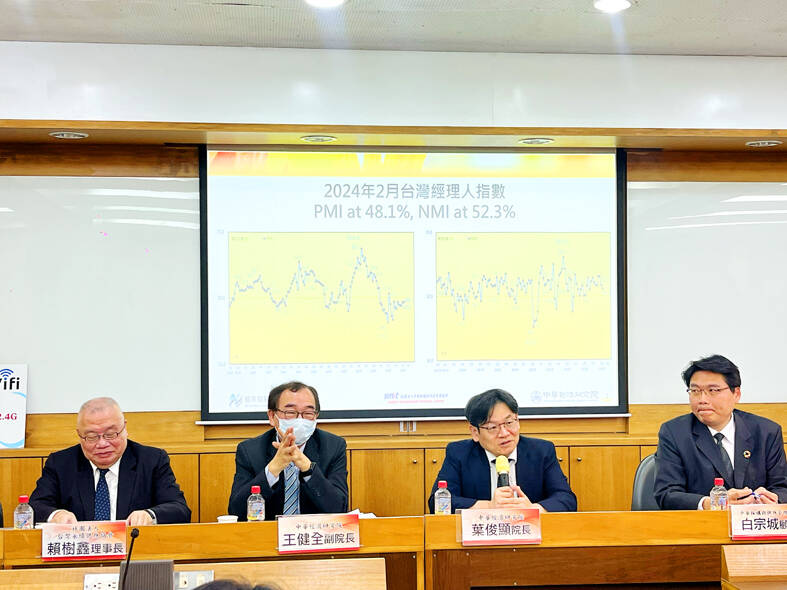Taiwan’s official manufacturing purchasing managers’ index (PMI) was 48.1 last month, virtually unchanged from January’s 48, as all sectors reported a decline in business mainly due to holiday disruptions, the Chung-Hua Institution for Economic Research (CIER, 中華經濟研究院) said yesterday.
However, firms were mostly confident about their business prospects, indicating that a rebound is around the corner, the institute said.
“The latest PMI showing is not bad given the significant drop in working days caused by the week-long Lunar New Year holiday in February,” CIER president Yeh Chun-hsien (葉俊顯) said.

Photo: Hsu Tzu-ling, Taipei Times
PMI data aim to gauge the health of the manufacturing industry, with scores of more than 50 indicating expansion and those lower than the threshold suggesting a contraction.
The barometer held steady, which was encouraging and had to do with expectations that business would pick up, Yeh said.
Order visibility might become clearer and boost purchasing activity from this month, he said.
Taiwan Semiconductor Manufacturing Co’s (台積電) recent opening of a wafer fab in Japan reflects an upturn in chip demand and would benefit the companies in its supply chain, he said.
At the same time, the six-month business outlook subindex gained 7.8 points to 54, returning to growth for the first time in 21 months, a sign that inventory adjustments for tech firms are close to ending, he said.
The surge in global demand for artificial intelligence (AI) is fueling local firms that supply AI severs, graphics processing units and other critical components, he added.
Holiday disruptions accounted for month-on-month declines in new orders, delivery time, employment, inventory and clients’ inventory, while industrial output and raw material prices increased, as firms prepared for improved business, the institute’s monthly report said.
The non-manufacturing index shed 1.2 points to 52.3 last month, because some sectors started to lose confidence as Taiwanese prefer to travel overseas and the number of inbound tourists is not growing fast enough, CIER said.
In particular, hotels and restaurants no longer held positive views about their business prospects due to the arrival of the low season and a high comparison base last year, it said.
However, financial institutions, property brokers and telecoms became optimistic, partly due to rallies on the TAIEX, it said.

When an apartment comes up for rent in Germany’s big cities, hundreds of prospective tenants often queue down the street to view it, but the acute shortage of affordable housing is getting scant attention ahead of today’s snap general election. “Housing is one of the main problems for people, but nobody talks about it, nobody takes it seriously,” said Andreas Ibel, president of Build Europe, an association representing housing developers. Migration and the sluggish economy top the list of voters’ concerns, but analysts say housing policy fails to break through as returns on investment take time to register, making the

‘SILVER LINING’: Although the news caused TSMC to fall on the local market, an analyst said that as tariffs are not set to go into effect until April, there is still time for negotiations US President Donald Trump on Tuesday said that he would likely impose tariffs on semiconductor, automobile and pharmaceutical imports of about 25 percent, with an announcement coming as soon as April 2 in a move that would represent a dramatic widening of the US leader’s trade war. “I probably will tell you that on April 2, but it’ll be in the neighborhood of 25 percent,” Trump told reporters at his Mar-a-Lago club when asked about his plan for auto tariffs. Asked about similar levies on pharmaceutical drugs and semiconductors, the president said that “it’ll be 25 percent and higher, and it’ll

NOT TO WORRY: Some people are concerned funds might continue moving out of the country, but the central bank said financial account outflows are not unusual in Taiwan Taiwan’s outbound investments hit a new high last year due to investments made by contract chipmaker Taiwan Semiconductor Manufacturing Co (TSMC, 台積電) and other major manufacturers to boost global expansion, the central bank said on Thursday. The net increase in outbound investments last year reached a record US$21.05 billion, while the net increase in outbound investments by Taiwanese residents reached a record US$31.98 billion, central bank data showed. Chen Fei-wen (陳斐紋), deputy director of the central bank’s Department of Economic Research, said the increase was largely due to TSMC’s efforts to expand production in the US and Japan. Investments by Vanguard International

WARNING SHOT: The US president has threatened to impose 25 percent tariffs on all imported vehicles, and similar or higher duties on pharmaceuticals and semiconductors US President Donald Trump on Wednesday suggested that a trade deal with China was “possible” — a key target in the US leader’s tariffs policy. The US in 2020 had already agreed to “a great trade deal with China” and a new deal was “possible,” Trump said. Trump said he expected Chinese President Xi Jinping (習近平) to visit the US, without giving a timeline for his trip. Trump also said that he was talking to China about TikTok, as the US seeks to broker a sale of the popular app owned by Chinese firm ByteDance Ltd (字節跳動). Trump last week said that he had